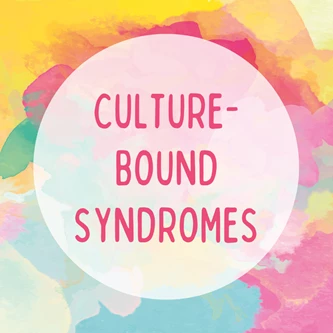 Culture-bound syndromes (aka culture-bound disorders) are sets of symptoms or illnesses that are recognized and identified within a specific cultural or ethnic group but may not have a corresponding diagnosis in the standard diagnostic classification systems (DSM or ICD).
Culture-bound syndromes (aka culture-bound disorders) are sets of symptoms or illnesses that are recognized and identified within a specific cultural or ethnic group but may not have a corresponding diagnosis in the standard diagnostic classification systems (DSM or ICD).
Understanding cultural-specific conditions is crucial for social workers--for practice and for the licensing exam (a practice question is included near the bottom of this post). Some culture-specific conditions to know:
-
Koro: Primarily found in Southeast Asia, koro involves an intense fear that one's genitals are retracting into the body, which can lead to panic and anxiety. Koro is deeply rooted in cultural beliefs and notions related to the importance of genitalia and sexual health in these regions.
- Amok: Observed in certain Southeast Asian and Pacific Islander communities, amok involves a sudden outburst of violent behavior, often followed by amnesia for the episode. It is associated with distress and social disruption and is influenced by cultural factors unique to these regions.
-
Ataque de Nervios: Seen primarily in Hispanic and Latino cultures, particularly among individuals from the Caribbean, this involves episodes of uncontrollable emotional distress, which may include crying, screaming, and physical expressions of distress. It is shaped by cultural beliefs and the significance of family and community ties.
-
Hikikomori: Observed in Japan, hikkomori involves extreme social withdrawal and isolation, often by young adults who become reclusive and refuse to leave their homes. Hikikomori is believed to be influenced by societal and family pressures for success and conformity.
- Kufungisisa: This term is used in Zimbabwe and other parts of Africa to describe a condition marked by excessive worrying and rumination, often accompanied by physical symptoms such as headaches or abdominal pain. Kufungisisa is often related to social and economic stressors.
-
Taijin Kyofusho: This is a Japanese culture-bound syndrome characterized by an intense fear of offending or embarrassing others through one's appearance, body odor, or behavior. It reflects the strong emphasis on social harmony and conformity in Japanese culture.
-
Windigo Psychosis: This condition is associated with certain Indigenous communities in North America, particularly among the Algonquian-speaking peoples. Windigo Psychosis involves a fear of becoming a Windigo, a mythical creature associated with cannibalism. It is often seen as a reflection of social and cultural factors, including the harsh living conditions and community dynamics.
These conditions can significantly impact how individuals from these cultural groups experience and express distress. Cultural sensitivity, understanding, and an openness to different cultural perspectives are essential for providing effective and respectful care and support to individuals experiencing these conditions.
Got that down? Let's test that out. Here's a free practice question about koro:
A social worker is conducting an assessment with a client from a Southeast Asian cultural background who has recently exhibited symptoms of "koro." The client expresses intense fear that their genitals are retracting into their body. Which of the following actions should the social worker take to provide culturally competent care?
A. Disregard the client's cultural beliefs and focus on standardized diagnostic criteria.
B. Explain to the client that "koro" is not an accepted medical diagnosis and encourage them to seek psychiatric evaluation.
C. Collaborate with the client to understand their cultural beliefs and incorporate them into the treatment plan.
D. Refer the client to a psychiatrist for a diagnosis and medication evaluation.
What's your answer?
In this scenario, the social worker should prioritize cultural competence and sensitivity. Option C is the most appropriate response as it emphasizes collaboration with the client to respect their cultural beliefs and incorporate them into the treatment plan. Disregarding the client's cultural beliefs (Option A) or dismissing "koro" as not a real medical condition (Option B) would be culturally insensitive. Referring the client immediately for psychiatric evaluation (Option D) may not be appropriate without first understanding the cultural context and beliefs surrounding their symptoms.
Simple enough!
For more questions about culture-bound symptoms and everything else on the ASWB exam, get started with SWTP's full-length practice tests. Nothing gets you prepared for licensure like realistic, real-time practice.
Happy studying and good luck on the exam!

 Culture-bound syndromes (aka culture-bound disorders) are sets of symptoms or illnesses that are recognized and identified within a specific cultural or ethnic group but may not have a corresponding diagnosis in the standard diagnostic classification systems (DSM or ICD).
Culture-bound syndromes (aka culture-bound disorders) are sets of symptoms or illnesses that are recognized and identified within a specific cultural or ethnic group but may not have a corresponding diagnosis in the standard diagnostic classification systems (DSM or ICD).